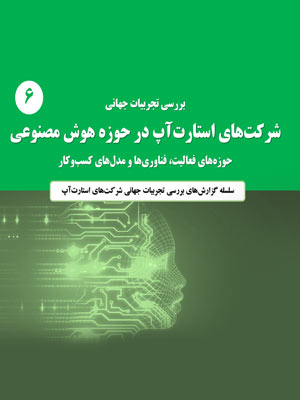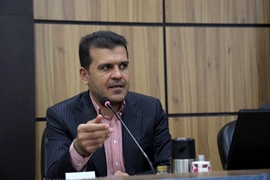Sattari: the Innovation Ecosystem Has Been Turned into another Model for Economic Sectors
In a special interview with IRIB news channel, Sorena Sattari, the vice president for science and technology affairs, described the innovation and technology ecosystem of the country, asking the government organizations to assist in facilitating the business space.

During the program, Sattari stated: conscription facilities have been provided for technological youth of the country with the help of the Supreme Leader, which is an unprecedented phenomenon in the history of our country. These facilities will enable individuals to pass their conscription period in a company. However, the authorities should note that they should not make barriers to the issuance of license for these individuals when facilities have been given by the Supreme Leader.
Sattari continued: we must realize that a great change has occurred in the business and entrepreneurship culture of Iran in the past few years. The production, growth and development of the country's technology and innovation ecosystem has led to a major change in the general public outlook. In contrast to the past, parents and the education system have realized that our youth study to create added value and not just to receive a degree.
The president of the headquarters for culture knowledge-based economy added: this change in public attitudes and culture-making will create more dynamism and prosperity in the country's innovation ecosystem, and the influx of startups and technology activists into this ecosystem will be more intense.
The Balanced Growth of the Innovation Ecosystem Requires More Attention
According to Sattari, there are more than 5300 knowledge-based companies in the country with a sales rate of more than 120,000 billion Tomans. About 41 companies arising from this ecosystem are traded on the stock exchange, which are valued at a total of 280,000 billion Tomans. The ecosystem has been formed properly in some fields and disciplines and is passing its natural growth path. However, the ecosystem has not matured in some areas.
The president of the national elites foundation pointed out the equal qualitative and qualitative growth of knowledge-based companies, affirming: despite the significant increase in the demand of young people, technology activists, and academia for the establishment of knowledge-based companies, the standards and criteria for registering a knowledge-based company are still as accurate and valuable as the product and company. This issue has been considered so that the quantitative growth of knowledge-based companies is in line with their qualitative growth.
He mentioned that corona was an unpredictable test for knowledge-based and creative companies, asserting: all observers in this field have confirmed that success of these companies in this area. All of a sudden, the country experienced a high demand for some products that were not produced at all or were produced at a low volume.
With a fast reaction, these companies have been able to establish numerous production lines across the country and have produced a considerable amount of masks, protective clothes, disinfectants, and medical equipment.
A Connection Has Been Made between Hundreds of Startups and Companies
Pointing out the strategies to develop innovation ecosystem in the country, the vice president for science and technology affairs mentioned: our work has been focused on the creation of value chains in the past few years. The elements of these chains have been connected like the cells of a body, which has led to the connection of hundreds of startups and companies in a specific field and production of products required in society.
According to Sattari, when a graduate is unable to find a job after 12 years, it means that we have fundamental problems in the education system.
In some fields, such as agriculture, despite the existence of capacity and major needs in the country, its graduates have difficulty in attracting to the labor market their specialized field. This issue must convince all the officials and decision-makers of the country that there must be a fundamental change and transformation in the country's education system so that this system meets the needs of the country. Every education in a period of 5-10 years must show itself in the country's economy.
The vice president for science and technology affairs continued: when you sell a barrel of oil with a volume of 154 kg, up to $40, but from abroad you buy a bottle of perfume with a volume of a few milliliters at a price of $100. A biotech vial weighing a few grams is valued less than $2,000, or a kilo of seeds is sometimes the equivalent of gold in agriculture.
The Reliance of Government on Unprocessed Raw Materials Is Fruitless
He also expressed: this shows the effect of knowledge and technology on raw materials. The reliance of economics on unprocessed raw materials is ineffective. It is necessary that knowledge and technology be used in combination with the country's vast natural, mineral and oil and gas reserves. It is not good for a country with the capacities and abilities of Iran to import 7-10 billion Dollars in the field of food security. These include imports from corn, meal, soybeans to imports of pesticides and vaccines and poultry and livestock medicine. The country's poultry industry imports about $3.5 billion.
Sattari claimed: this number must decrease by using the capacity of knowledge-based and technological companies. The production of vaccines, drugs and enzymes required by this industry is one of the things that technology activists can do for this industry.
The vice president for science and technology affairs continued: when we talk about the ecosystem, we mean the knowledge-based and technological startups and companies, which can find technological solutions for problems. Several historical mistakes have been made in policy-making of the country in the field of research. We must understand that government money will not lead to successful and continuous research. It is necessary that the research be done with the capital of the private sector and by this sector. The government sector must be a mentor and policy-maker in the research field, and large government research institutions must open their doors to the private sector to be effective. The university can also be effective when it generates income by producing products, goods, knowledge, technology and technical services and selling them to industry and people.
Eight Percent Growth in the Field of Specialized Articles
The president of the headquarters for culture knowledge-based economy pointed out the barriers to the entrance of knowledge-based companies to the stock exchange market, expressing: many of the assets of these companies are intangible assets. Valuation of these assets should be based on the intrinsic value of this technology and knowledge. A small pharmaceutical company in some developed countries has the knowledge that leads to the production of billions of dollars of drugs, and this is the technology that affects the shares of that company in the stock market, this issue should also be considered in our country's stock market.
According to Sattari, the country has grown by eight percent in the field of specialized articles compared to last year. Today, Iran is ranked 15th in the world in this area. In addition, Iran is ranked below 10 in many engineering fields. Of course, in some fields of humanities and arts, the country ranks around 30 and 40 in the world, and this position has caused the country to be ranked 15th in the world, otherwise Iran's global ranking in the field of article production would probably be less than 15.
Pointing out the long administrative processes of some organizations, Sattari stated: since a few years ago, when attempts were made to create a separate part in economics that have laws based on the knowledge-based and resistance economy, we have aimed to increase the influence of policy-making and coordination tools and correct the faulty mechanisms of the country to facilitate the conditions of knowledge-based and technological companies.
Sattari, stating that the path of the economy can be changed gradually and with practice at work, said: in this case, we can make a model of the country's innovation ecosystem for all economic fields, something that has already happened and this model has caused That other sections should also think about changing the approach.
According to the vice president for science and technology affairs, more than 140 services are given to knowledge-based and technological companies. One of these facilities is the conscription facilities proposed by the Supreme Leader so that people could spend their time in knowledge-based companies. Officials should see that when the leader of a country offers such facilities and assistance to knowledge-based and technology companies, they should not be strict in issuing a few simple licenses.
Loans Cannot Help Startups
Explaining the financial support of the innovation ecosystem in the country, Sattari marked: a network of sponsorship funds has been set up, and efforts have been made to attract private sector investment. However, it should be noted that a startup does not go with a loan, but in a startup, the venture capital process must take place. Many startups grow by 10% weekly, which is not normal and shows considerable growth. In the corona challenge, startups providing training services suddenly experienced significant growth. Iran has the largest companies in the region in the fields of online sales, online taxis and Fintech services.
Pointing out the necessity of develop the market for knowledge-based products, Sattari affirmed: export of knowledge-based companies is complicated. For instance, exporting a particular drug to a country requires a lengthy licensing and laboratory process. These companies have been assigned services and support packages in the field of patent registration, export consulting, customs issues, attending foreign exhibitions and many other fields. It should be made clear to everyone that these are the companies that can make a difference, commercialization is the work of the private sector and should not be left to the public sector.
A report by the public relations and information center of the Vice-Presidency for science and technology affairs














comment